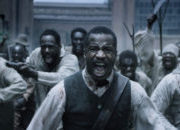
Filmmaker Nate Parker’s powerful directing debut The Birth of a Nation that was hailed as a masterpiece in many quarters in Sundance earlier this year, is based on the controversial account of Nat Turner’s life and the slave rebellion he led in 1831. The perfect timing of the premiere in the very same month the Academy of Motion Pictures were embroiled in a major public squabble about the lack of visibility of people of color in movies, also probably raised awareness of the movie more than usual.
All slaves took the surnames of their owners and when young Nat Turner (Tony Espinosa) is allowed to play with Samuel the Turner heir (Griffin Freeman) who is the same age, he is treated well by Samuel’s mother (Penelope Anne Miller). In fact when she discovers the young slave can actually read, encourages his studies by giving him a Bible. However asides from this he is not granted any other privileges from the family and is expected to put in long back breaking days picking cotton with his own family and living in their squalid shacks with barely enough food to eat.
Grown up and now the slave’s preacher too Nat (Nate Parker) still has enough of a rapport with Samuel (Arnie Hammer) who is now his master to persuade him to buy Cherry a young slave (Aja Naomi King) before she is snapped up by another more unscrupulous plantation owner. She is privileged to become a house slave which is a slightly easier life than working in the fields, and before long she and Nat are a married couple with a baby of their own. This at least is some respite from the hardships that they continue to endure such as when one of the other owners matter-of-factor expects to Cherry to submit to his sexual demands without question.
When all the Plantation Owners in the region get together for a meeting, they discuss their real fear of rumors of the slaves planning insurrections. So the rather obnoxious Rev Walthall (Mark Boone Jr) hits on the idea of Samuel renting Nat out as a visiting pastor in the hope that his preaching to all the slaves will quell any ideas of them rebelling. It actually has the reverse effect as the more Nat tours Virginia and is exposed to even worse mistreatment than on his own plantation and is actually forced to witness a slave be brutally tortured, it hardens his resolve to start to plan to fight back.
It took a great deal of persuading on his part to get others to take part but over the time he managed just this with the result that the uprising he led resulted in a bloody battle with the victorious slaves taking 60 white lives. Naturally the plantation owners did not take this lying down and now determined to ruthlessly exact their revenge killed over 200 slaves in retaliation.
Even though Nate Parker spent some 8 years working on the project before filming started, and did some painstaking research of the facts with his co-writer Jean McGianni Celestin, nevertheless part of the controversy has been on the reliability of the accuracy of the narrative. That aside, Parker’s compelling movie even with it’s incessant and despicable violence that makes no attempt to hide its partisan take on that period in our country’s history, still makes for compulsory viewing regardless.
It is very obvious too that Turner had a grand vision for every aspect of this movie, as every single detail from the carefully selected cast …….he should qualify for both a nomination for his acting and his direction probably ….to the stunning cinematography by Elliot Davis is the best than it can be, which is no mean achievement for a newbie director.

